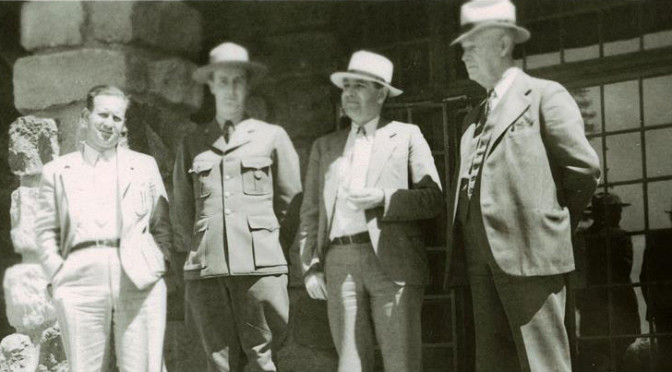Hall was the Park Service’s chief forester and head of its education program in the 1920s.
Yes. In fact, the Park Service had an office at the University of California in Berkeley down on Fulton Street. As you have said, the Carnegie Institution was able to funnel some money through National Academy of Science or by other means to help, the Park Service, with things like the Sinnott Memorial and the Yavapai Station at Grand Canyon. He influenced operations in that respect, as well as being the chairman of this committee.
We talked earlier about how grandfather sort of lost out during the 1930s once Mr. Albright became director. This rather ties in with some correspondence that I have between grandfather and Newton Drury, who later was director of the Park Service. Grandfather became concerned about the Park, Parkway and Recreation Area Study Act and how the parks could be changed from the old classic areas to this idea of bringing in Civil War battlefields and recreation areas. He mentioned specifically the city parks in Washington. His position tended to be counter to the direction the Park Service was going, particularly in the 1930s under the ECW program in the Roosevelt era. At that point, his direct influence on park matters probably lessened somewhat. When Drury became director in 1940, grandfather had more access to discussion about the management of the national parks since they had always been fairly close due to their work in the redwoods and with the state parks in California. I remember some discussions when father was superintendent of Yosemite that concerned the story of granite, which grandfather wanted interpreted. This is not in the park itself, but down the Merced River Canyon below El Portal. Grandfather seems to have had some professional differences with Dr. Francois Matthes, who was probably the leading expert on Yosemite’s geology, over which over which formations were critical in the development of the area around Yosemite. Grandfather was also involved with the field school in Yosemite Valley. He used to talk to them about various kinds of geological problems.
Several other things affected the amount of influence he had in the parks. One was that he retired from the Carnegie Institution in 1938. This terminated his ability to provide funding for projects. Another factor was my grandmother’s death in 1940. Grandmother was a great influence on him and had accompanied him on most of his travels to the national parks. As a result, he didn’t travel around quite so much to the parks. He became an adjunct professor at the University of Oregon in 1939, though a courtesy appointment much like the one I have here at Oregon State. When a person retires, however, their influence is not as great as it was before. I’ve seen letters between my father and Newton Drury that suggest Drury did not want my grandfather telling him what to do at every turn, as grandfather did with his son. As a result, some differences developed because grandfather was a strong personality. He had views that didn’t allow for much compromise.


